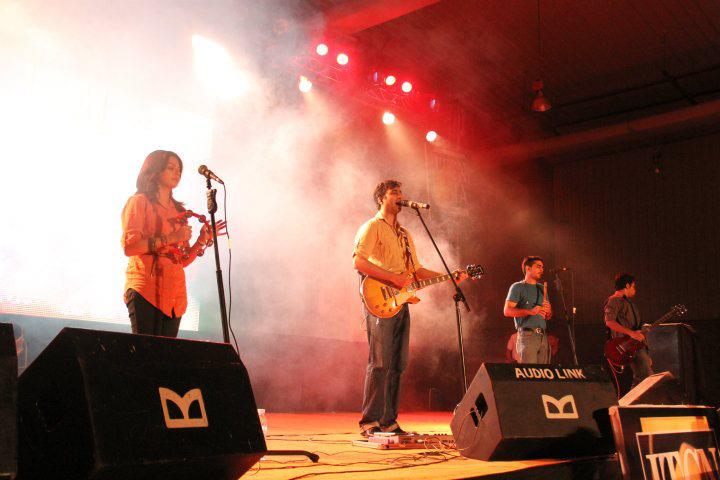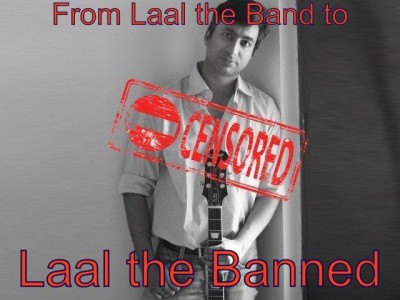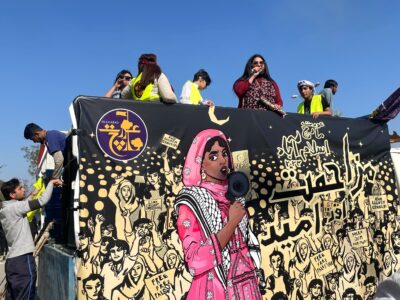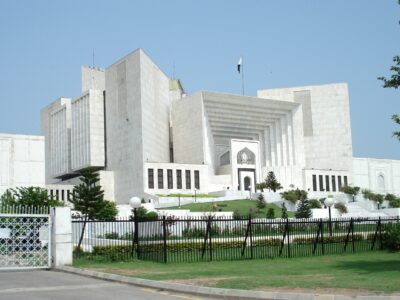Social media in Pakistan was buzzing with anti-government sentiment last week after the popular Facebook page of progressive and leftist rock band ‘Laal’ was blocked countrywide.
In a blocking spree, the Pakistan Telecommunications Authority (PTA) sent multiple requests to Facebook which blocked various leftist and progressive pages locally. Shortly thereafter, the block on Laal's page was lifted, though others remain inaccessible.
With more than 400, 000 likes, Laal's page has a strong social media fan following– the huge uproar over the blocking was no surprise. But while the page is now accessible again, the question remains — what specifically caused Laal, a self-described itself ‘revolutionary band,’ to be blocked in the first place?
Four events that may have triggered the blocking of Laal's page:
1. Recently, Hamid Mir, a leading Pakistani TV journalist, accused the country's top spy agency the ISI, of orchestrating an assassination attempt on him, which he narrowly escaped. The general public and various other news channels portrayed Mir and his TV channel as “anti-ISI” and anyone supporting the anchor as “anti-army” and an “Indian agent”.
Laal expressed an opinion about local media coverage of the incident on their page:
“[Hamid] Mir may be right or wrong in his accusation, only evidence will determine that. But this attitude of calling all those who criticise the ISI as traitors is totally ridiculous and deeply fascist. It is the reason why violence, death and destruction continues to flourish in Pakistan.”
Anything anti-army is taken almost as seriously as blasphemy in Pakistan, so this may have been the cause of the block.
2. Band member Dr. Taimur Rahman openly spoke out against peace negotiations with Taliban:
“Dear negotiations committee. One cannot solve extremism by accepting the Talibanization of Pakistan”, and “Don't bow to the Taliban just because they are violent and aggressive. Fight them.”
3. The group also discussed what has become an unspeakable issue –- the missing persons of Balochistan and the hunger protest a youngster went through in the last few months.
4. In line with its pro-Communist standing, Laal also regularly shares revolutionist poetry and passages of figures like Habib Jalib, Faiz Ahmed Faiz, Bhaghat Singh and Marx and Lenin. While the content does not constitute blasphemy or anything close to it, it does have the potential of triggering a mass movement or inciting people to take action against the government’s dubious ways of dealing with terrorism.
Laal is unblocked. Hooray? Not really.
Laal's Facebook page was made accessible in the country after just two days. Good news? Yes, but not as much as you think. Remember that Laal has a pretty strong fan base and an equally strong support system with reach extending to lawyers, advocacy groups, local and international media.
Other banned page owners who have been blocked cannot fight back in a similar way. Are these people left with any options after they’re blocked?
For the record, PTA does not deign to first ask the page owners to take the “immoral” content down before going straight to the court of Facebook. Interestingly, the PTA Act 1996 does not say that the regulatory body is allowed to directly put forward requests of blocking web pages.
It is the Inter-Ministerial Committee for the Evaluation of Websites (IMCEW) that directs PTA to block content it deems to be against the law. The validity and steps involved in this process of ‘requesting’ is ambiguous and impossible to challenge, to say the least.
So who is really in charge here – PTA, IMCEW, MoIT, or some “higher-ups”?
Taimur talks about such issues from time to time and has become more aggressive after falling prey to this blocking spree. However, major news outlets don’t cover smaller pages as vigorously as they did in this case. ‘Roshni.pk’ and ‘Talibaans Are Zaalimaans’ are only two of the many other pages that remained blocked.
The unblocking of Laal may look like a win, but if you step back and assess the bigger picture, it only reveals the extent to which the government can censor with impunity.
The spontaneous unblocking was clearly a ploy to stop us from creating more outrage — the unblocking of Laal was a minor battle won in a war we are losing.
Here are some other pages that are equally progressive, anti-Taliban, or anti-capitalism and are devoid of blasphemous content but are still victims to the state blocking spree:Roshni Pakistan,TalibaansAreZaalimaans, Lashkar e Bhangvi,Zalaan, Bhensaa and Saeenjii.
Nighat Dad is a Pakistani lawyer, who focuses on cyber crime, privacy, surveillance, Internet law and policy, technology and human rights. She is also the founder and director of Digital Rights Foundation, Pakistan.










5 comments